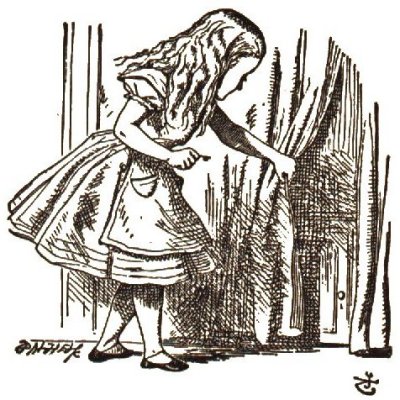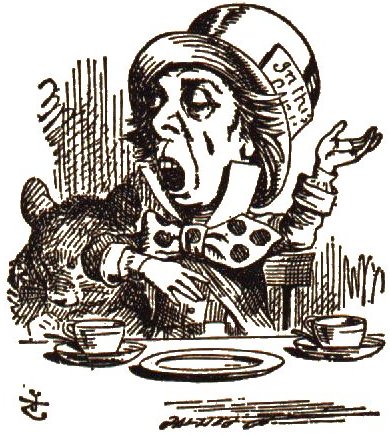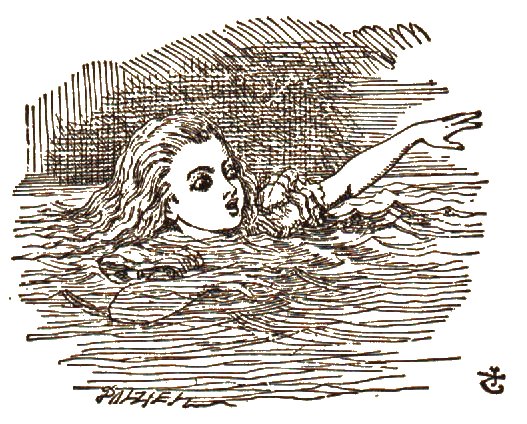 After reading THIS INTERVIEW with Madeleine L’Engle (thanks Chestertonian Rambler for the link), I was tempted to title this post Loopy L’Engle or Christian Author Loses Footing. Really, it’s a brief, interesting interview. There’s just a couple of comments that left me kinda cross-eyed. Like, this:
After reading THIS INTERVIEW with Madeleine L’Engle (thanks Chestertonian Rambler for the link), I was tempted to title this post Loopy L’Engle or Christian Author Loses Footing. Really, it’s a brief, interesting interview. There’s just a couple of comments that left me kinda cross-eyed. Like, this:
Q: What are you against?
L’Engle: Narrow-mindedness. I’m against people taking the Bible absolutely literally, rather than letting some of it be real fantasy, like Jonah. You know, the whole story of David is a novel … Faith is best expressed in story.
Q: If the Bible is not literally true, does that mean we don’t need to take it seriously?
L’Engle: Oh no, you do, because it’s truth, not fact, and you have to take truth seriously even when it expands beyond the facts.
Danger Will Robinson! Danger! The Bible is “truth, not fact.” Did I get that right?
Perhaps it’s an exercise in semantics or just a symptom of our postmodern age, but when did truth and fact get divorced? According to Dictionary.com, the primary meaning of “truth” is ‘Conformity with fact or actuality.’ I actually have a head on my shoulders. Any assertion otherwise — based on lack of sleep, heavy drinking, or e. coli poisoning — is simply not true. But apparently, this reasoning no longer holds water.
The following word was chosen as the Word of the Year both in 2005 and 2006:
 Accordingly, the word is used “to describe things that a person claims to know intuitively or ‘from the gut’ without regard to evidence, logic, intellectual examination, or actual facts.” For instance, I cannot factually prove the Dodgers are on their way out of the playoff hunt, but I seem “to know [it] intuitively or ‘from the gut'” (a sinking feeling I get every year this time).
Accordingly, the word is used “to describe things that a person claims to know intuitively or ‘from the gut’ without regard to evidence, logic, intellectual examination, or actual facts.” For instance, I cannot factually prove the Dodgers are on their way out of the playoff hunt, but I seem “to know [it] intuitively or ‘from the gut'” (a sinking feeling I get every year this time).
In this way, the Bible is effectively castrated.
Ms. L’Engle: “I’m against people taking the Bible absolutely literally, rather than letting some of it be real fantasy, like Jonah.” In other words, Jonah is a metaphor, a fairy tale, a vehicle to convey truth rather than an actual historical person / event. No doubt, some biblical stories ARE metaphors. Jesus spoke in parables and it’s fairly clear when He did. The problem is when we make the story of Jesus a parable.
Here’s the issue:
- The Bible presents the story of Jonah, not as a myth, but as a factual, historic event
- Jesus confirmed the factuality of the Book of Jonah
This is so very important. Look at the words of Christ:
. . . just as Jonah was three days and three nights in the belly of the sea monster, so will the Son of Man be three days and three nights in the heart of the earth. (Matt. 12:40 NASB)
According to Christianity, the most important historic event was the Resurrection of Christ. If Jonah was a myth, make-believe, then why would Jesus cross-reference a real — and really important — event with a non-factual “fantasy.” This effectively undermines the historical accuracy of Scripture and mythologizes the most important event in biblical history.
When the Bible presents something as an historical FACT, who are we to say it’s not?
That’s the problem with a non-literalist position: We become arbiters of what’s TRUTH and what’s FACT. So anything I seriously question — like someone parting an ocean, walking on an ocean, or living for three days in the belly of a fish underneath an ocean — I just call it truthy.
But isn’t this what James Frey got canned for?
 Though all truth cannot be immediately confirmed by fact, where there is truth, facts will follow. It is a symptom of our modern age to think otherwise. While other religions are built upon assertions, creeds and disciplinary systems, Christianity is built upon a series of historic events. If someone can disprove the factuality of any of these events, the truth of Scripture is undermined. Or, like the apostle Paul said
Though all truth cannot be immediately confirmed by fact, where there is truth, facts will follow. It is a symptom of our modern age to think otherwise. While other religions are built upon assertions, creeds and disciplinary systems, Christianity is built upon a series of historic events. If someone can disprove the factuality of any of these events, the truth of Scripture is undermined. Or, like the apostle Paul said
. . . if Christ has not been raised, our preaching is useless and so is your faith. (I Cor. 15:14 NIV)
If the Resurrection never really happened, and Jesus never really lived or died, then why the heck should I believe anything He supposedly said? Because it’s truthy? In that case, I feel like I don’t have a head on my shoulders. Can you prove me wrong?















You are sooo politically incorrect, touting this unpopular idea of absolute truth! But I’m with ya, brother. I am with you.
Mike,
I agree with you , BUT I’m a little surprised by your stance on this issue. You have often cited the parables as a defense for Christian fiction that does not have any overt references to Christ. Were you not saying the same thing? That not only can Truth can be discerned from fiction, but it is more powerful the less direct it is?
A good story (parable) can communicate a truth while making up facts(fiction).
Don’t worry, Mike. I’m still with you on this. I believe the story of Jonah and David are fact. And, I would caution anyone to act as arbiter of such when it comes to the Bible. Unless Jesus or the text declares it just a story, I’m taking it as fact.
However, true literalists often miss hyperbole or cultural references that don’t mean exactly what they seem to mean. Sometimes a sentence does not equal the sum total of its words. I think Hank Hanegraaff makes a good argument for this. “We must interpret scripture in the light of scripture.” The Bible is self-defining when it comes to the issues. But a careful examination is necessary.
-dayle
Before you get all up in arms about what I’m going to say, let me preface it with this: I believe Jonah and David to be historical occurences.
That being said, I agree with Dayle that we sometimes take things too literaly and miss the sarcasm or hyperbole or whatever. I don’t literally believe the sun rises and sets, though the Psalms say that. Those who did excommunicated Copernicus and Galileo.
Also, I don’t know that I agree with you about the equation of truth and fact. That’s actually a Modern notion tied up with objectivism and how the sciences developed (although science developed that way because of how philosophy developed but now I’m Alice on a rabbit trail). Because of my interest in the postmodern stuff, I went back and studied the Medieval era and its transition to Modernism. One of the things I learned was how they viewed truth, which was not necessarily “just the facts, ma’am.” It was the hero being honored (King Arthur stories) or beauty being delighted in, the morality being learned (Grimm’s Fairy Tales or Chaucer’s Canterbury Tales). It’s not that they would have said these things to be historical wrong, but they wouldn’t have asked the question.
Sometimes I think we get caught up in the wrong questions. Yes, I believe Jonah to be historically true, but that’s not the point. Same with Creation.
Is it important to believe that Jesus actually walked this earth as God-man? Absolutely. I don’t think there’s a slippery slope to these things. I don’t think L’Engle was a heretic for believing Jonah to be a fantasy or David to be a novel. In fact, I believe Jonah to be fantasy and David a novel. I also happen to think they historically happened (and I think the Jews would be none too pleased with me for saying that their greatest king was made up), but the point of Jonah is not to settle whether it happened or not but to learn the lesson of God intervening on earth through a reluctant and selfish man.
Duran, love this post. I’m with you. All the way.
Dayle, thanks for your comments! I don’t see a discrepancy between the power of story (fiction) and the necessary connection of Truth to Fact. I’d suggest that the degree to which stories, parables and myths ARE meaningful directly relates to their connection to Fact. A fairy tale whose message was “Love and friendship aren’t important” would lack bite (and probably not be very popular). Why? Because it doesn’t correspond to what’s really true.
Fiction is powerful, in part, when it confirms or “strums” a genuine existential chord, corresponds to experience and Fact.
Jesus’ parables are so important precisely because they were grounded in Fact — the Fact of His existence and their correspondence to the Moral universe. The Parable of the Sower would still ring true even if it was spoken by the Mad Hatter. Why? Because it embodies genuine spiritual truths. The fact that the story was told by Someone Who was born of a virgin, healed the sick, cast out devils, was crucified and raised from the daed, significantly increases the weight of the tale. Their is Fact behind His Fiction.
I wrote: “. . .some biblical stories ARE metaphors. Jesus spoke in parables and it’s fairly clear when He did. The problem is when we make the story of Jesus a parable.” You’re correct that “literalists” create an abnormal set of blinders. My intention with this post, however, was to point out the danger of the opposite extreme. Just as much (maybe more) damage is done by those who make Jesus the Mad Hatter — a cartoonish fairy tale — than those who “literalize” everything. If we kick out Facts and the need to judge Truth by them, we might as well replace the Bible with Alice in Wonderland.
Hey, thanks for your comments, Dayle. Really good stuff!
Thanks, Heather! Your comments are always thoughtful and pointed, and I appreciate your taking the time to leave them. And no, I’m not all up in arms. . . A couple of rejoinders:
While we may disagree about the connection of Truth to Fact, I’d suggest that your opinions only have weight in that they are Factual. You “don’t literally believe the sun rises and sets.” Why? Have you personally seen something to contradict that? You said, “the equation of truth and fact. . . [is] actually a Modern notion tied up with objectivism and how the sciences developed.” Really? How do you know this? So you “went back and studied the Medieval era.” But how do you know the Medieval era even existed? I’d suggest your point only has weight as it corresponds to Evidence, History, Reality, Factuality.
We’ve spoke before about Myth and I agree that God has placed eternity into the hearts of men, and Myth is an echo of it. The problem is when we drop that mythological filter over the Bible. What makes the Bible story so important is that IT IS MYTH BECOME FACT. When we question the factuality of Scripture, we undermine its authority. If Jesus didn’t really rise from the dead, He’s no better than Neo — and probably not nearly as photogenic as Keanu Reeves. King David may be an archetype for King Arthur, but to reduce the slaying of Goliath to folklore is to do a great injustice to the shepherd boy and the Book that tells his tale.
Once again, I understand the deficiencies of literalism. Nevertheless — and this is the big point — the Bible presents itself primarily as an historical record. All of it? Of course not. But it starts with a Creation event that leads to a real Fall, a real Flood, and a real People being chosen. Some myths may prefigure these events. But if the events the Bible described never really happened, why trust anything else it says? I mean, what makes Scripture different than the Bhagavad Gita? Sure, we may allegorize historical events. But when we deny their Factuality we are on a slippery slope toward non-sense.
Thanks again, Heather! Terrific questions! Lord bless you and yours. . .
“You’re correct that “literalists†create an abnormal set of blinders. My intention with this post, however, was to point out the danger of the opposite extreme. Just as much (maybe more) damage is done by those who make Jesus the Mad Hatter — a cartoonish fairy tale — than those who “literalize†everything. If we kick out Facts and the need to judge Truth by them, we might as well replace the Bible with Alice in Wonderland.”
I think I’m largely in agreement with you here. Certainly if Christ is fictional, Christianity is meaningless–though even then I’m not certain that I wouldn’t want to live life as if Christianity was true, because otherwise I’d despair. And I didn’t go from Christ’s existence to the Scriptures, but rather the reverse. Which makes sense, as they are God-breathed.
I’m not sure how far the slippery-slope argument works, though. I know a lot of people (starting with C.S. Lewis) who had no problem admitting evolution may be a valid scientific theory, and then turning to the life-changing power of the historical God-man Christ who died and rose again. Lewis certainly never showed much signs of twisting Scriptures to avoid the tough things God had to say about his life–on the contrary, I sometimes think that his focus on meaning rather than incident allowed him to see those hard things rather more clearly.
Finally, I’ll posit that a purely fairy-tale Jesus is far more valuable than a purely fairy-tale Alice. Or maybe far more deadly. Either I’m going to end up with a baptised imagination or I’m going to end up hating a world that taunts me with a sorrowful, loving, challenging, dying-and-resurrecting, omnipotent God who is good. In either case, the very shadow of Christ is something quite different from the topsy-turvey satire of Alice. It shows us something completely apart from this world of our senses–Alice just fills in our world’s details.
Hi Mike, Please give me some Godly advise. In our church,on Christmas Eve, there will be poems read which were written by Madeleine Engles. I find it rather shocking what she believes or rather what she doesn’t believe about Christianity. I am an elder and a member of the worship committee in our church. I am most of all a ‘ shepherd of the flock’, and have to watch our doctrine closely. What do I do; go on a war path? Do I over react when I challenge the person who has put the service together with my theological arguments re; Madeleine E.? Or do I just let it go by – let it be! I’ll wait for your response. Ernst….P.S. Enjoyed your brilliant blog